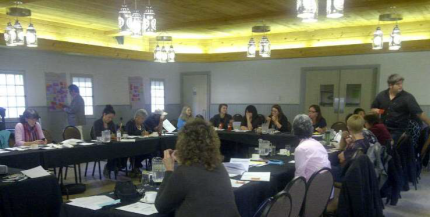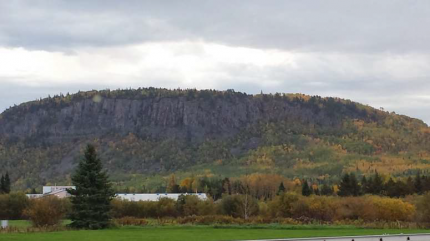Ontario Food and Nutrition Strategy – Engagement with First Nations On-Reserve Communities
Posted: April 16, 2014
Categories: Food Strategies / GoodFoodBites / News from Sustain Ontario / Ontario Food and Nutrition Strategy
 The Ontario Food and Nutrition Strategy Design Team have been working with a variety of groups to develop an Ontario Food and Nutrition Strategy (OFNS) that addresses the needs and challenges for all Ontarians to have access to healthy food through sustainable food systems. The opportunity to meet with First Nation on-reserve communities arose in July 2013. A planning committee was struck, including representatives from the OFNS Design team, Chiefs of Ontario, the Ontario division of the First Nations and Inuit Health Branch (FNIHB) of Health Canada, and the Nishnawbe Aski Nation (NAN). After several months of coordinated planning, we held our engagement meeting with participants from 13 different First Nation on-reserve communities in Thunder Bay at the Fort William National Park on October 1-2, 2013.
The Ontario Food and Nutrition Strategy Design Team have been working with a variety of groups to develop an Ontario Food and Nutrition Strategy (OFNS) that addresses the needs and challenges for all Ontarians to have access to healthy food through sustainable food systems. The opportunity to meet with First Nation on-reserve communities arose in July 2013. A planning committee was struck, including representatives from the OFNS Design team, Chiefs of Ontario, the Ontario division of the First Nations and Inuit Health Branch (FNIHB) of Health Canada, and the Nishnawbe Aski Nation (NAN). After several months of coordinated planning, we held our engagement meeting with participants from 13 different First Nation on-reserve communities in Thunder Bay at the Fort William National Park on October 1-2, 2013.
 Over 2 days, we experienced beautiful sunny days, the most amazing meals prepared with local ingredients, and of course, we discussed the meaning of a provincial food and nutrition strategy for First Nation people living on-reserve. We also learned about initiatives already happening in First Nation communities, through the Aboriginal Diabetes Initiative funded by the FNIHB, and the NAN Food strategy
Over 2 days, we experienced beautiful sunny days, the most amazing meals prepared with local ingredients, and of course, we discussed the meaning of a provincial food and nutrition strategy for First Nation people living on-reserve. We also learned about initiatives already happening in First Nation communities, through the Aboriginal Diabetes Initiative funded by the FNIHB, and the NAN Food strategy
The feedback received from this meeting was so needed and valuable, as the voices of these communities are often overlooked or ignored. We heard stories about communities facing continual issues with the high cost and poor quality of market foods. However, we also heard that communities are finding innovative ways to address their challenges. Some NAN communities are having success with the Get Growing project, where community members create their own ways of addressing food access through social enterprise.
All of the participants felt that the engagement meeting successfully achieved the objectives of sharing the draft OFNS, and other initiatives for First Nations people living on-reserve. Through open dialogue, participants shared valuable insight and feedback on the OFNS. Participants also felt that the meeting provided them with an opportunity to network and share what was happening in their own communities. All participants agreed that their voices and ideas were heard and everyone was interested in being engaged in future OFNS activities.
As part of the process for creating a comprehensive OFNS, the First Nations on-reserve planning committee will submit recommendations for revisions to the OFNS. We are also seeking input from off-reserve First Nations people, as well as Inuit and Metis communities.
This experience demonstrates that community participation and engagement is truly powerful. There is a wealth of knowledge and experience among our diverse communities. As one participant said “You will not get the full picture sitting on a big committee unless you talk to the communities who face challenges. It is the only way that you find out about the gaps and how to address them”.
The Ontario Food and Nutrition Strategy – First Nations On-Reserve Discussion report can be accessed on the Sustain Ontario website:
Submitted by Candace Aqui, on behalf of the Ontario Food and Nutrition Strategy Design Team. Photos courtesy of Rebecca Truscott.
One response to “Ontario Food and Nutrition Strategy – Engagement with First Nations On-Reserve Communities”
Leave a Reply
You must be logged in to post a comment.

[…] the summary and discussion report of the Ontario Food and Nutrition Strategy’s consultations dedicated to First Nation on-reserve commu… in […]